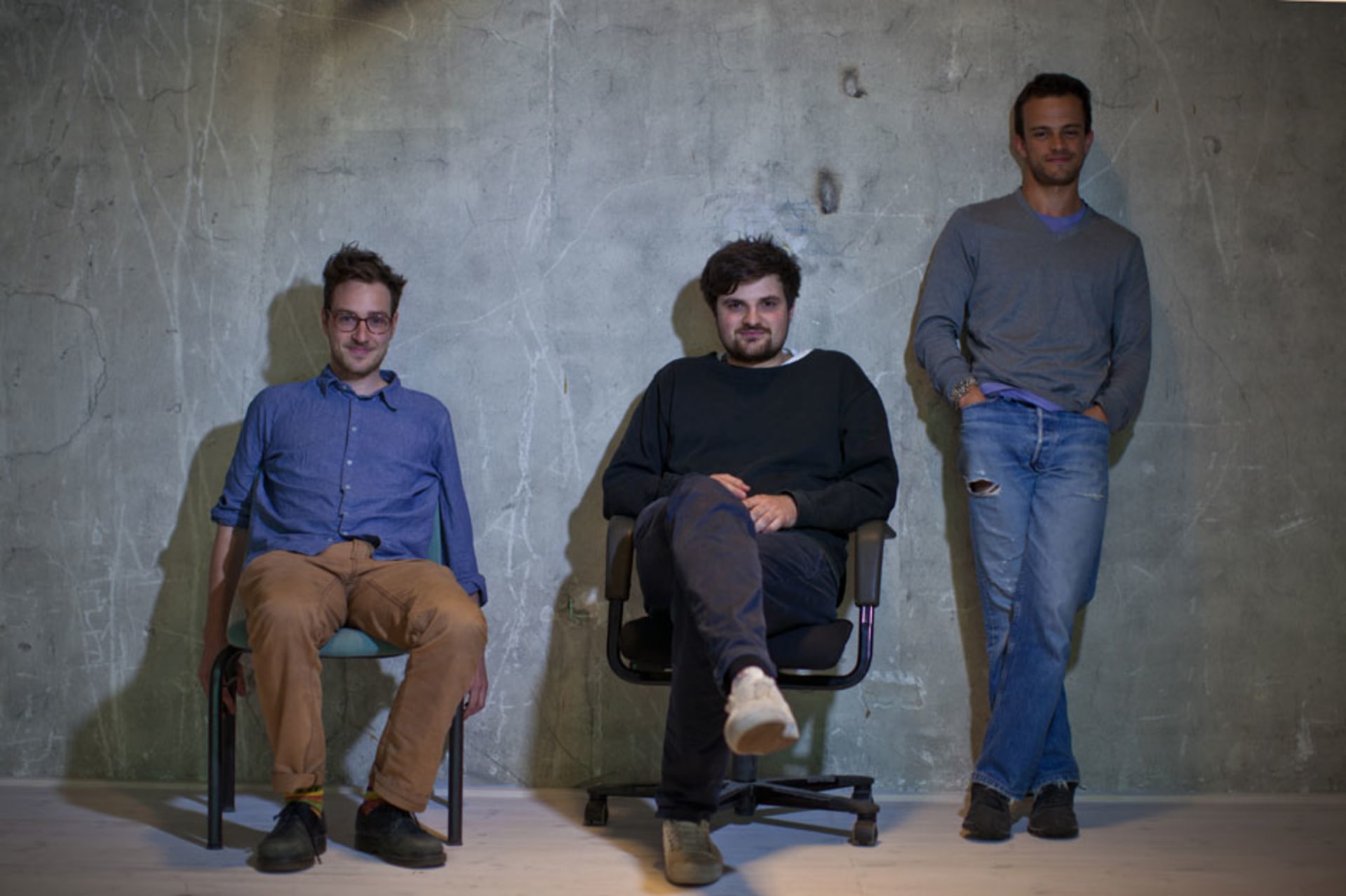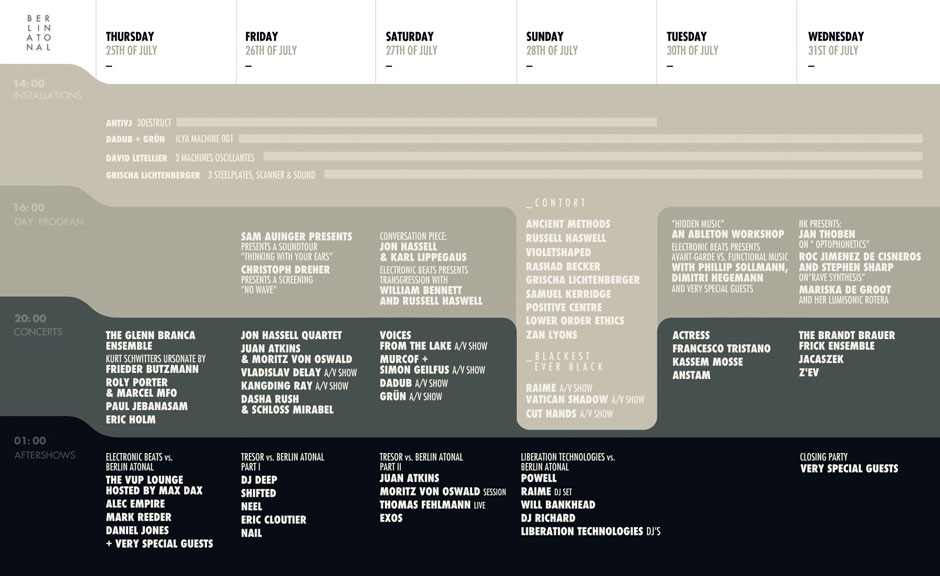
Part 2: Berlin Atonal’s New Organizers On The Revamped Festival
[15.07.2021. Content warning: an article published by J.-H. Kabuiku on July 9th 2021 points out Dominick Fernow’s consistent links with metal and noise artists, bands, labels and productions using pedophilia and sexual violence imagery, listing a number of regular collaborators explicitly affiliated with National Socialism and white power ideology. More on this here]
The first (West) Berlin Atonal Festival in 1982 belongs to the category of events that have the power to change our perception of a city entirely. Founded by Dimitri Hegemann (who is also the founder of the Tresor Club, Tresor Records and the director of the Kraftwerk in Berlin), the festival coined (West) Berlin as a city that originated serious, existentialist music—as performed by Einstürzende Neubauten, Nick Cave & The Bad Seeds or the early Depeche Mode. After pausing for 23 years, the Atonal Festival returns to the now reunited city of Greater Berlin with a stellar cast of concerts (featuring Glenn Branca, Moritz von Oswald & Juan Atkins, Vatican Shadow, John Hassell, Actress and more), public lectures and other activities that deal with the unique space of the Kraftwerk. The festival runs from July 25th until July 31st. Stay tuned for updates and more info or check out their website. Electronic Beats is proud to be Berlin Atonal’s 2013 official media partner.
Electronic Beats: How would you describe the spirit of the Berlin Atonal?
Harry Glass: A little paradoxical. In order to escape tradition and explore new territories, the festival has to embrace some traditions—the tradition of electronic music, the early versions of the festival itself. At the same time we are aware of the danger of over-intellectualizing things.
Paulo Reachi: We want to have the festival as open as possible in its musical approach. To us, music is definitely a positive force. In this day and age, the festival’s function is perhaps somewhat different to what it was in the 1980s. Its not so much about confrontation, but rather about exploration. The festival should be a chance for people to see things in an alternative light—in different surroundings and perhaps with a new outlook on the future. This, combined with the new technical possibilities that changed our world completely in the last ten years, are the parameters of Berlin Atonal.
Hans Ulrich Obrist is currently meeting all the artists and musicians who were born around the time when the Atonal Festival stopped. He calls the people who were born around 1989 the “diamond generation” who basically grew up with the internet and take the evolutionary process that comes with the ongoing inventions—from computer to smartphones to borderless communication—as a natural thing.
Laurens von Oswald: I don’t know that term. But that is our generation. We use and like computers. [Harry and I] were both born in 1988. It’s a funny coincidence that we are basically the same age as Dimitri Hegemann when he started Atonal in 1982.
Dimitri Hegemann: The Atonal Festival is a statement against the mainstream culture and marketing-driven curation. It is a statement against typecast line-ups and the formatted radio that we all know and that destroys our capability to listen. It is basically a statement against any kind of manipulation via the media. People love to listen to white noise, but you still can’t hear it on the radio. I mean, of course you can, if you listen to the right internet radio channels, but this is actually a prime example of how certain people still have not understood how our modern times function.
Do you try to change the world?
DH: No, we aren’t reinventing the wheel. And that’s never been the point. We do however need new ways to express ourselves—and to connect the various disciplines. We yearn for new sounds, uncharted, unexplored new sounds and territories. I personally want Berlin Atonal to be an event where music, art, film, architecture and science merge. I understand the world as a space that consists of a thousand plateaus, and one of our primary goals is to offer a way for the people from the various disciplines can exchange with each other. That’s how new ideas and new sounds take shape. But we’re not changing the world.
You are known to believe that the spaces where things happen are very important.
DH: Spaces are most important. It’s not a coincidence that the Kraftwerk is one of the most stunning spaces in the world. I think that ideas will unfold easier in inspiring environments. Conversations too. I mention this, as an integral part of the Atonal Festival will be panels and public talks. You know, I believe in passing on information from one generation to the next. Public talks can serve this purpose. We can transfer ideas.
Social media starts at the lunch table we are sitting at.
DH: Exactly. Before it was called social media, it was called word of mouth. As I said before, people tend to forget that Berlin is unique at this particular moment because it attracts so many people from all over the world. Atonal tries to consolidate these people for a couple of days in one huge and inspiring space. Thirty years ago, our approach was even more radical. Program wise, we were confronting our audiences with pure noise and never-heard-before sounds. Today, we are much more diversified.
One of the signs of our times is that what used to be atonal music has become a common taste. You said it before, but people listen to white noise for breakfast. Eliane Radigue would probably be happy about this development.
LVO: Being shocked is not that shocking anymore. It’s more difficult and more interesting to use limits and traditions to create something, rather than just rely on the shock of tearing everything down, which is maybe an old-fashioned and now lazy type of art.
DH: Yesterday, I listened to Alban Berg’s Lulu. He wrote it in 1937, and even though it is only a fragment as he never completed this piece, it was just like a series of explosions in my head. It was just wonderful. Since yesterday I have been thinking how we could include Lulu into Atonal.
Why?
DH: Because I want to share this series of explosions with everybody.~
You can read part one here and part three here. Berlin Atonal takes place from July 25th-July 31st.

Published July 11, 2013. Words by Max Dax.
